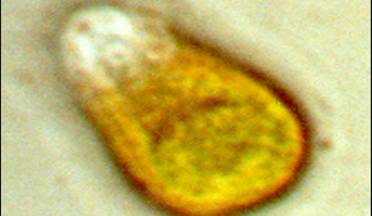Israeli researchers develop seaweed-based treatment for child blindness
By Dan Even | May 27, 2013 | Haaretz
Israeli researchers develop seaweed-based treatment for child blindness
Researchers at Sheba Medical Center find that powder produced from orange algae can help treat an eye disease that causes blindness at a young age.

A powder produced from an orange algae can help treat an eye disease that causes blindness at a young age, researchers at the Sheba Medical Center in Tel Hashomer have found.
Retinitis pigmentosa is an inherited disease that causes degeneration of the photoreceptor cells in the retina. It leads to a gradual narrowing of the sufferer's field of vision and eventual loss of night vision and color perception, until sight is totally lost. It's the second most common cause of blindness in children, after physical trauma, and until now it was regarded as incurable, although its progress can be somewhat slowed by treatment with vitamins A and E. In Israel it occurs in one of every 3,500 births.
The Sheba study treated participants with a material produced from the algae, known as dunaliella bardawil. The discovery originated when Prof. Ami Ben Amotz did reserve duty near Lake Bardawil on the northern coast of the Sinai Peninsula, back when Israel still controlled the area. Ben Amotz, who was a student at the Weizmann Institute of Science at the time, noticed an orange hue covering part of the lake, and he took back some of the algae for analysis at Weizmann. The unicellular algae turned out to be very rich in the anti-oxidant 9-cis beta-carotene.
One of Ben Amotz's students, Dr. Avi Shaish, continued to study the algae, at first at Weizmann and later in the Sheba research labs for lipids and atherosclerosis. Thus it also came to the attention of Prof. Michael Belkin, director of the ophthalmic technologies lab at Sheba, who raised the idea of studying its effectiveness against retina degeneration.
The study was conducted by the head of the retina research lab at Sheba, Dr. Ygal Rotenstreich, who produced a concentrated powder from the algae and made pills out of it. At first it was tested on seven patients suffering from night blindness, and after 90 days of treatment, there was considerable improvement in their night vision and in the electrical performance of the retina.
"A test known as ERG checks the electrical function of retinal cells that are stimulated by light, and serve as an objective measure of improvement," Rotenstreich said.
The study was then expanded to 30 patients with retinitis pigmentosa, who were treated for 90 days, some with the algae powder and some with a placebo. Then the treatments were switched, with those who had been given the placebo taking the algae pills, and vice versa. Neither the patients nor their doctors knew who was being given what, and when.
It emerged that 34 percent of the patients experienced a significant improvement in their field of vision and electrical retina response, but only after they had been treated with the algae. Some experienced as much as a quadrupling of their field of vision. There was no improvement among the first group during the period they were given the placebo.
Because the algae is fatty, patients experienced some loose stools, but otherwise there were no significant side effects. The findings were published in the May issue of JAMA Ophthalmology, published by the American Medical Association.
"The results of the study are encouraging, because until now there was no known treatment that improved the vision of those suffering from retinitis pigmentosa," said Rotenstreich.
Sheba has launched another, broader and lengthier clinical trial to determine whether the algae can prevent blindness, and how it interacts with the various genetic mutations that cause retinitis pigmentosa.
In recent years, Sheba has also been studying dunaliella bardawil as a treatment for other conditions. In November 2011, Sheba published the results of a study showing that the algae was effective in treating the skin condition known as psoriasis. Other studies indicate the algae can help raise the HDL (good) cholesterol and reduce triglycerides in the blood, and also help treat diabetes.
The algae is now being specially grown in Eilat by a Japanese-owned firm in order to increase the content of its active ingredients, Rotenstreich said.








